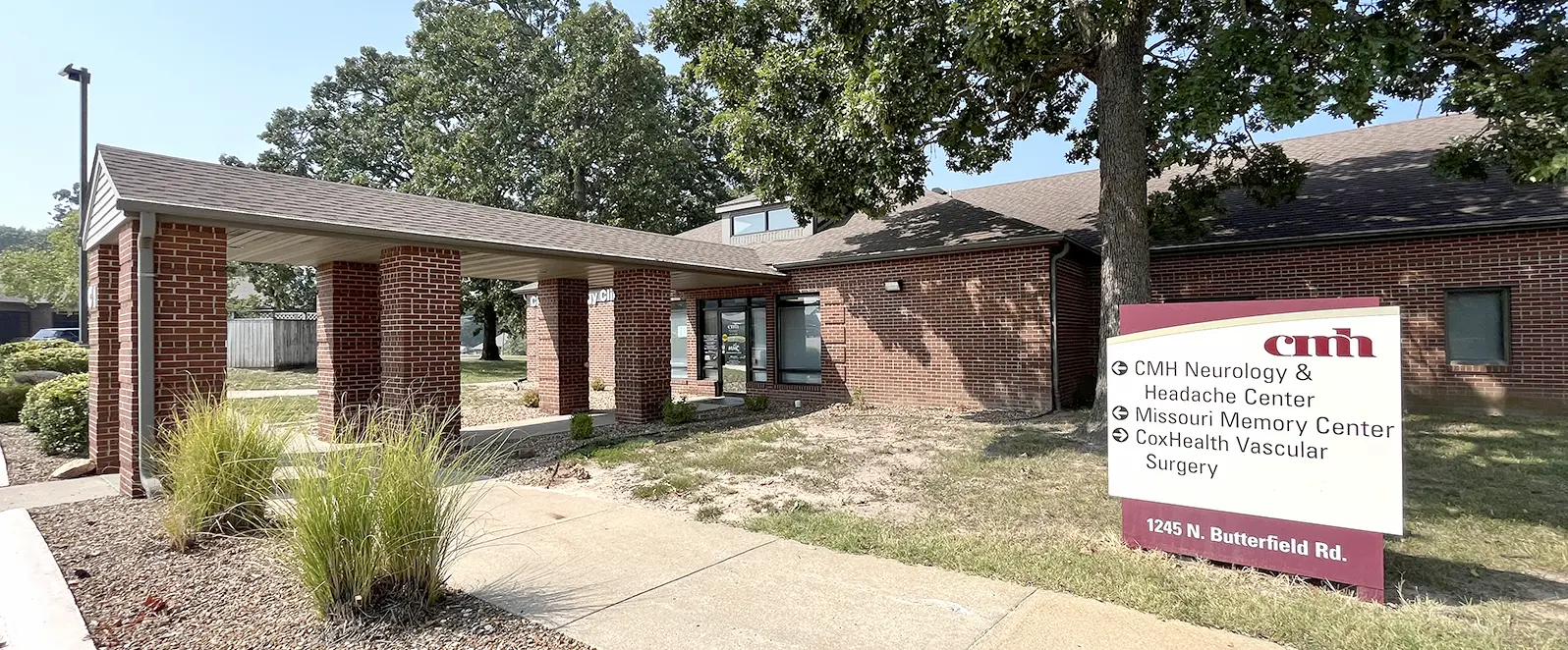
Research at CMH
Clinical studies help develop new medicines to treat various illnesses. CMH Neurology and Headache Center and the Missouri Memory Center started clinical research studies in 2016 for patients with Alzheimer's Disease and migraine headaches. CMH started the Research Department in 2023 to expand research into other areas.
Clinical Research at CMH
The CMH Research Department is featured in this CEO Update video recorded in June 2024. Learn about the history or research at CMH, successes and the future of research at CMH. UPDATE: The Food and Drug Administration approved Kisunla (donanemab) July 2, 2024, for the treatment of early-stage Alzheimer's disease.
John Duff was one of the first patients in southwest Missouri to receive a Kisunla transfusion in September 2024. The drug is shown to reduce amyloid plaques in the brain, which are associated with Alzheimer's disease, and slow the disease's progression. Learn more about this treatment and the first infusion.
Watch the CMH Neurology and Headache Center Research video to learn more about research opportunities through CMH. Curtis Schreiber, M.D., with the CMH Neurology and Headache Center and Missouri Memory Center, talks about these studies and why to participate in clinical trials. He is the principal investigator for the Research Department.
Curtis Schreiber, M.D., discusses the innovative approaches being taken in research, memory care and neurology care at Citizens Memorial Hospital in Bolivar, Missouri. Learn about recent advancements and future plans.
About Clinical Trials
Clinical trials research and study how well new treatments work. They often provide world-class care and offer benefits to participants.
Patients in clinical trials gain:
- Access to cutting-edge diagnostic tools
- In-depth clinical monitoring
- Personalized care throughout the study
- Low-cost or free treatment
Clinical trial treatments go through many rounds of testing before they are used on people. Those who participate in clinical trials help to advance treatment and improve the lives of future patients.
Interested in a Clinical Trial?
Let us know in one of these ways that you want to be part of a clinic trial:
- Call 417-328-7781 to speak directly to a research coordinator.
- Submit the information request form. After submission, a research coordinator will call you to discuss research studies and ask you some medical questions to determine eligibility.
- Submit the Migraine Research Questionnaire.
- Submit the Alzheimer's Study Questionnaire.
- Submit the Pre-Clinical Alzheimer's Disease Questionnaire.
Clinical Trial Status: Recruiting
CMH Research is recruiting patients for these clinical trials. Click on the study title for more details from the National Library of Medicine's Clinical Trials website.
Early Alzheimer’s Disease study: Phase 2. randomized, Placebo-controlled, parallel group, 72-week study to evaluate the efficacy and safety of VHB937 in participants with early Alzheimer’s Disease followed by an open-label extension.
Official Title: A Donanemab (LY3002813) Prevention Study in Participants With Alzheimer's Disease
Study Purpose: To evaluate the safety and efficacy of donanemab in participants with preclinical Alzheimer's Disease.
Clinical Trial Status: Active, Not Recruiting
CMH has patients participating in these clinical trials but is not recruiting new patients for the trials. Click on the study title for more details from the National Library of Medicine's Clinical Trials website.
Official Title: A Study of Remternetug in Participants With Alzheimer's Disease
Study Purpose: To collect safety and efficacy information regarding the study drug remternetug in participants with early Alzheimer's disease.
Official Title: A Study of Donanemab in Participants With Early Alzheimer's Disease
Study Purpose: To see how safe and effective the study drug donanemab is in participants with early Alzheimer's disease.
Evaluation of P-tau 217 assay by measuring changes in the intended patient management between pre- and post P-tau 217 results: a randomized clinical utility study.
Clinical Trial Status: Completed
CMH patients have participated in these clinical trials that are completed. Click on the study title for more details from the National Library of Medicine's Clinical Trials website.
Official Title: A Study to Evaluate Treatment Satisfaction With Erenumab in Participants With Migraine
Study Purpose: To evaluate the effect of erenumab on medication-specific treatment s
Official Title: A Study of LY3202626 on Disease Progression in Participants With Mild Alzheimer's Disease Dementia
Study Purpose: To evaluate the safety and the effect on brain tau of the study drug LY3202626 in participants with mild Alzheimer's disease (AD) dementia.
Official Title: A Study of Solanezumab (LY2062430) in Participants With Prodromal Alzheimer's Disease
Study Purpose: The main purpose of this study is to investigate the safety and efficacy of the study drug solanezumab in participants with prodromal Alzheimer's disease (AD).
Official Title: A Study to Evaluate the Safety, Tolerability, and Efficacy of Long-Term Gantenerumab Administration in Participants With Alzheimer's Disease
Study Purpose: This is an open-label, multicenter, rollover study to evaluate the safety, tolerability, and efficacy of long-term administration of open-label gantenerumab in participants with AD who completed Study WN29922 or WN39658, either the double-blind or open-label extension (OLE) part.
Official Title: Safety and Efficacy Study of Gantenerumab in Participants With Early Alzheimer's Disease
Study Purpose: This randomized, double-blind, placebo-controlled, parallel group study will evaluate the efficacy and safety of gantenerumab versus placebo in participants with early (prodromal to mild) AD. All participants must show evidence of beta-amyloid pathology. Eligible participants will be randomized 1:1 to receive either subcutaneous (SC) injection of gantenerumab or placebo. The primary efficacy assessment will be performed at the end of the double blind period at week 116. Participants will then be offered to enter into an open-label extension (OLE). Participants not willing to go to the OLE will participate in a long term follow-up period for up to 50 weeks after the last gantenerumab dose.
Official Title: A Study to Evaluate the Efficacy and Safety of Fremanezumab for Preventive Treatment of Migraine in Patients With Major Depressive Disorder
Study Purpose: The primary objective is to evaluate the efficacy of monthly 225 mg sc fremanezumab in adult patients with migraine and major depressive disorder (MDD). The secondary objectives are to evaluate the efficacy of monthly 225 mg sc of fremanezumab in adult patients with migraine and MDD on the reduction of MDD symptoms, responder rates in monthly migraine days, improving quality of life, improving disability, and the safety and tolerability of monthly 225 mg sc and quarterly 675 mg sc fremanezumab in adult patients with migraine and MDD.
Official Title: A Study to Evaluate the Efficacy and Safety of Erenumab in Adults With Medication Overuse Headache
Study Purpose: Study 20170703 is a phase 4, randomized, double-blind, parallel-group, placebo-controlled study to evaluate the efficacy and safety of erenumab against placebo in subjects with chronic migraine (CM) who have a history of at least 1 preventive treatment failure and are diagnosed with medication overuse headache (MOH).
Official Title: Effect of Erenumab-aooe on Disability and Work Productivity in Employed Subjects with Episodic Migraines
Study Purpose: To evaluate the effect of erenumab compared to placebo on disability in employed subjects with episodic migraine (EM) who have previously failed 1 or more migraine preventive treatments.
Providers

Curtis Schreiber, M.D.
Medical Director of CMH Research Department
Principal Investigator
- Started participating in clinical trial research in 1999 and has overseen over 220 research studies
- Started conducting research studies at CMH in 2016
- CMH Research Department was developed in June 2022

Caressa Patel, PA-C
Sub-Investigator
- Started working in research at CMH in January 2022

Robert Denney, Psy.D.
Sub-Investigator
- Clinical Rater performing cognitive testing in research studies
- Started participating in research studies at CMH in April 2017

Robert Coffman, Psy.D.
Sub-Investigator
- Clinical Rater performing cognitive testing in research studies
- Started participating in research studies at CMH in 2020

Lindsay Vo, Psy.D.
Sub-Investigator
- Clinical Rater performing cognitive testing in research studies
- Started participating in research studies at CMH in 2022
Locations

CMH Neurology and Headache Center
1245 N. Butterfield Road, Bolivar
Directions to CMH Neurology and Headache Center
CMH Research Department Staff

Kasie Atchison, LPN
Clinical Research Manager
- Started working in research at CMH in March 2018
- OTC Practical Nursing Program graduate in 2010
- Previous work history includes five years at Mercy in Neurotrauma ICU and eight years in community health at Greene County Justice Center with three of those years as Assistant Director of Nursing

Erin Camden, RN
Clinical Research Nurse Coordinator
- Started working in research at CMH in May 2023
- 19 years of professional nursing experience at area hospitals and in public health and public school settings
- Bachelor of Science in Nursing from the University of Central Missouri in Warrensburg

Kasey Greteman, RN
Clinical Research Nurse Coordinator
- Started working in research at CMH in June 2023
- 3.5 years of professional nursing experience: 1 year in orthopedics at Mercy Hospital Springfield, 2.5 years in geriatric psych at Citizens Memorial Hospital
- Graduated with an Associate in Nursing Degree (RN) from Bolivar Technical College in 2020 and received a Bachelor of Science in Nursing from Chamberlain University in 2021

Julia Schreiber
Regulatory Coordinator
- Started working in research at CMH in 2019
- Worked with Alzheimer's disease and other dementia patients and caregivers since 2016
- Active volunteer for Alzheimer's disease and other dementia causes